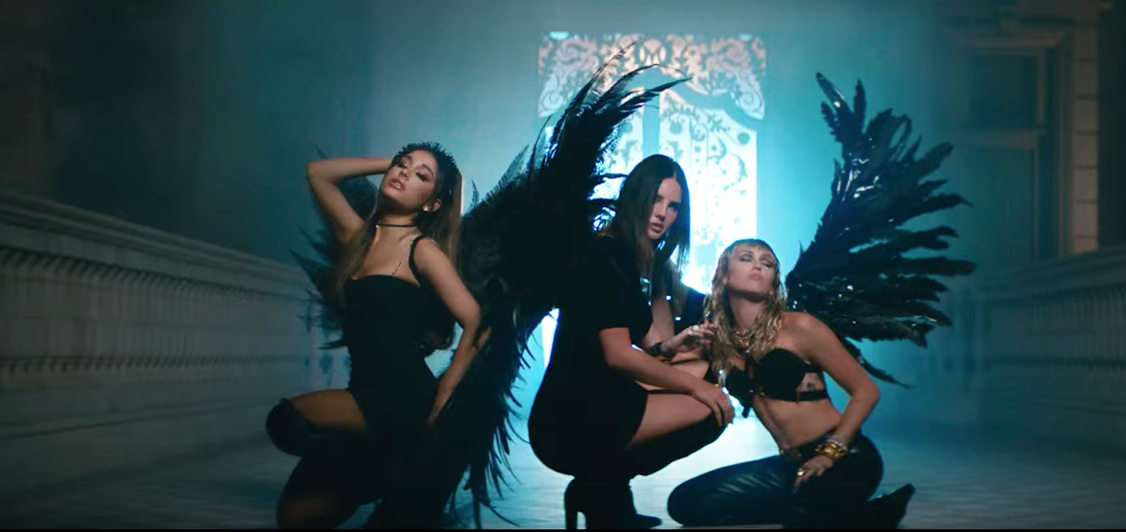Another decade, another remake. Charlie’s Angels was doomed to be next, of course, and even famously lampooned film remakes via LL Cool J on a plane watching TJ Hooker: The Movie as he balked at it in his dashiki. Yet McG’s 2000 version of the story remains, let’s be honest, a cinematic masterpiece of 00s pop culture. Along with it, the song Destiny’s Child provided for the soundtrack, “Independent Women, Pt. 1” (the Pt. 1 being somewhat frivolous to the title). While Destiny’s Child was an assuring trio, the latest one to come together to provide music for Charlie’s Angels is slightly less so.
Yet despite concerns that the musical mélange of Ariana Grande, Miley Cryus and Lana Del Rey might not necessarily jive regardless of the trios’ recent love-in with one another (between Miley covering “No Tears Left to Cry” and “Summertime Sadness” and Lana covering “Break Up With Your Girlfriend, I’m Bored”), their collaborative track for “Don’t Call Me Angel” comes off surprisingly well. And maybe that’s perhaps because it sounds like three different songs in one. With Grande’s “sweet” vocals tying together the narrative and sonic thread of Miley and Lana’s usual styles, there is a cohesiveness to the song that serves to pick up where Destiny’s Child left off in declaring, “Tell me how you feel about this/Do what I want, live how I wanna live/I worked hard and sacrificed to get what I get.” While the message of independence in “Don’t Call Me Angel” persists, there’s a more biblical undertone to it (in spite of Beyoncé being the Christian belle of Texas), with an overt Del Rey influence in motifs depicting an angel fallen to earth now living as a devil (also conjuring images of Billie Eilish’s latest video for “all the good girls go to hell”).
The video that accompanies, directed by Grande staple Hannah Lux Davis, deviates greatly from the Destiny’s Child approach in that the only actual allusion to the movie occurs when Elizabeth Banks appears at the end to tell them, “Angels, this isn’t our house. Time to go to work.” What’s more, there are certainly no lyrical callouts to Naomi Scott, Kristen Stewart or Ella Balinska–perhaps because none of those names roll off the tongue, like “Lucy Liu, with my girl Drew/Cameron D and Destiny.” Or even any nods to Charlie himself. Where the video for “Independent Women, Pt. 1” offered a premise about a Charlie’s Angels Boot Camp (Lesson 1: Agility, Lesson 2: Altitude, Lesson 3: Combat and Lesson 4: Speed) set in a very futuristic by 2000 standards facility, the storyline of “Don’t Call Me Angel” fittingly keeps each of the women very separate when they’re not laughing and eating grapes amid an accordingly Dionysian tableau. This is telling not only because of just how separate each pop singer’s vocals are, but likely because the way women “work together” often stems from working independently and perfecting their skills in order to combine them when the time comes. For Miley, that seems to be boxing, for Lana, throwing knives (with one scene of her in particular landing it on the target of a groin being instantly iconic) and for Ari, well, she’s really busy being responsible for singing most of the song. And is additionally most notable for standing out for being the only one to don white wings at any point (later joining the others in black ones), likely pandering to her sugary sweet appearance not necessarily coinciding with her actions and inner thoughts. As she plays the lookout on a rooftop (the helicopters passing by reminding Lana fans of the “High by the Beach” video) or waxes poetic alone in a decadent room, saying such mixed metaphors as, “Dontcha know I bite when the sun set?” (is she a vampire, an angel or some twenty-first century hybrid?), Grande’s role in the video is to control her backup. The kind of backup that displays a very different form of feminism than what was touted in Destiny’s Child’s day.
For yes, there is undeniably more unbridled hostility in the “independent from men” mantras of “Don’t Call Me Angel.” Whereas “Independent Women, Pt. 1” spoke of a purer definition of feminism (“Always 50/50 in relationships”), it seems these angels are out for male blood after being sexually inspired by a praying mantis. Del Rey’s lines, in particular, admit to a certain pleasure in attracting a man and then torturing him as she croons, “I appreciate the way you want me, I can’t lie/I drop it low, I back it up/I know you wanna think you’re mine/Baby, I totally get it/You can’t guess/So you can’t get me off your mind.” Elsewhere, Grande, in her “7 Rings” way, whorishly alludes to the idea that maybe if a man actually could pay for her lifestyle, she’d be down, mocking him instead by saying, “You can’t pay my price.” Scenes of Miley smacking around a man tied to a chair in a boxing ring as she condescends, “All my girls successful and you just our guest…/You better stop the sweet talk and keep your pretty mouth shut” further add to an overall palette of more hostile “feminism.” One that verges as much as it can on the tenets of Valerie Solanas at a mainstream level. That Grande, Cyrus and Del Rey are able to “get away” with doing so is undoubtedly a sign of the times that have come to pass since the more whitewashed days of the McG-directed Charlie’s Angels.
So yes, these women are “picking it up” (to quote “No Tears Left to Cry”) where Destiny’s Child left off, but they are in no way about to obsequiously pander to any man, least of all Charlie, from the looks of their insouciance. Unlike Destiny’s Child, who obeisantly concluded their video with the cheerful classic line, “Good morning, Charlie.” If anything, “Don’t Call Me Angel” is doing its best to say, “Goodbye, Charlie”–that name being a synecdoche for patriarchy at large.




















